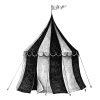a great resource on Jewish-Christian writings
A few years ago, I was researching the life of Denise Levertov, one of my favorite poets. I read in one of her book introductions about the spiritual influence of her mother, described as a Welsh mystic–but I wanted to know more about her name which seemed Jewish. It turns out her father Paul Levertoff was a Russian Jew who emigrated to England and became an Anglican priest, leading one of the first (if not the first?) Jewish-Christian congregations in England. At the time I was researching, I could find little information on him anywhere except a small scholarly article by a seminary student (guess it’s time for someone to write a Wikipedia article?!).
I saved the links and hoped the scholar would dig up more. Levertoff had apparently written some intriguing-sounding books like Shekinah and Christ and Love and the Messianic Age, but they were out of print and nowhere to be found.
Today must’ve been my lucky day because I was thinking about Paul Levertoff again and my google search turned up a Facebook page completely dedicated to his writings and life. The page has several videos explaining his life story and teachings; tbey’re done in such a way that really translate Hassidic rabbinical stuff to a gentile Christian like me. The page also has information on where to buy those aforementioned intriguing books–just republished this year!
Facebook page on Paul Levertoff
Also, the page is published by Vine of David, a site dedicated to scholarly works by early Messianic writers (i.e., Jewish texts on Jesus) from a variety of periods. It seems like a new project by scholars and translators. But it’s a motherload of stuff that hasn’t been out there before! I love their donation page statement:
Imagine that you are standing in front of a deep well of fresh, cool water. You are parched and thirsty, but “you have nothing to draw water with, and the well is deep. Where do you get that living water?” (John 4:11).
Though the water is right in front of you, it might as well be on another continent. If you were thirsting to death, how much would you give for a bucket and rope?
There is a deep well of living water in front of us, but it has been locked away from millions of Jews and Christians. That well of water is the literary heritage of Messianic Judaism: Hebrew Gospel studies, apologetics from Messianic rabbis, Chasidic teachings of Jewish believers, the Messianic Siddur and Machzor, Messianic Jewish history, stories, testimonies, and teachings that connect believers with the past and build a bridge to the future of Messianic Judaism.
But most of this pre-holocaust wisdom and spiritual wealth is written in Hebrew, German, Yiddish, and other eastern European languages and presented in genres of Jewish learning and logic which are largely incomprehensible to most modern readers. The Messianic Jewish heritage has been forgotten in old European libraries and remains completely inaccessible to English readers. It remains like water at the bottom of a deep well from which no one can drink.
Vine of David was created to draw spiritual water out from those depths. Our goal is to collect these lost writings, transcend the language barrier and make the living water of early Messianic Judaism available to English readers.
 All of this to say, over five years ago I wrote a book. It is called A Little Book on Poverty and Glory. I spent a few months writing it, cultivating it, then I spent nearly a year laying it out and designing it. I commissioned an artist friend of mine, Linnea Spransy, to illustrate the cover. And paid a good penny to have a talented designer at Jolly Design in Austin to put it all together. And then I worked with both an independent letterpress in Chicago and an independent hand-sewing bookbinder in Madison, Wisconsin to bring it all together.
All of this to say, over five years ago I wrote a book. It is called A Little Book on Poverty and Glory. I spent a few months writing it, cultivating it, then I spent nearly a year laying it out and designing it. I commissioned an artist friend of mine, Linnea Spransy, to illustrate the cover. And paid a good penny to have a talented designer at Jolly Design in Austin to put it all together. And then I worked with both an independent letterpress in Chicago and an independent hand-sewing bookbinder in Madison, Wisconsin to bring it all together.